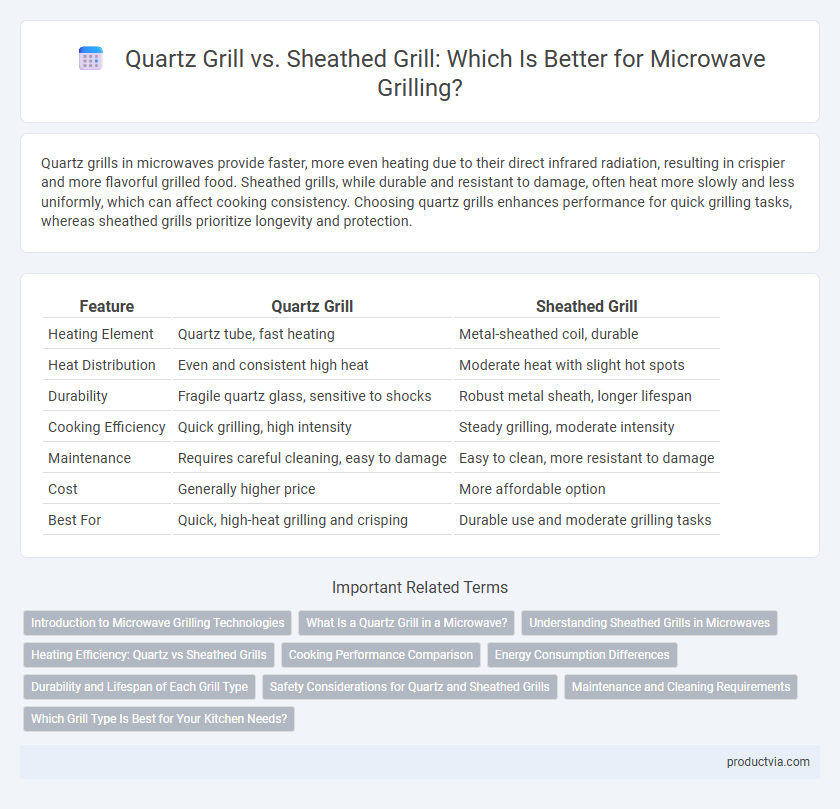Quartz grills in microwaves provide faster, more even heating due to their direct infrared radiation, resulting in crispier and more flavorful grilled food. Sheathed grills, while durable and resistant to damage, often heat more slowly and less uniformly, which can affect cooking consistency. Choosing quartz grills enhances performance for quick grilling tasks, whereas sheathed grills prioritize longevity and protection.
Table of Comparison
| Feature | Quartz Grill | Sheathed Grill |
|---|---|---|
| Heating Element | Quartz tube, fast heating | Metal-sheathed coil, durable |
| Heat Distribution | Even and consistent high heat | Moderate heat with slight hot spots |
| Durability | Fragile quartz glass, sensitive to shocks | Robust metal sheath, longer lifespan |
| Cooking Efficiency | Quick grilling, high intensity | Steady grilling, moderate intensity |
| Maintenance | Requires careful cleaning, easy to damage | Easy to clean, more resistant to damage |
| Cost | Generally higher price | More affordable option |
| Best For | Quick, high-heat grilling and crisping | Durable use and moderate grilling tasks |
Introduction to Microwave Grilling Technologies
Microwave grilling technologies primarily utilize quartz grills and sheathed grills, each offering distinct heating methods to enhance cooking performance. Quartz grills employ infrared quartz tubes that rapidly heat up, providing intense and even browning, while sheathed grills use metal-clad heating elements encased in protective sheaths to deliver consistent, durable heat. Choosing between quartz and sheathed grills affects energy efficiency, heat distribution, and grill longevity in microwave appliances.
What Is a Quartz Grill in a Microwave?
A quartz grill in a microwave uses quartz infrared elements to generate intense, radiant heat that cooks food quickly and evenly, resembling traditional grilling. These quartz elements heat up rapidly and provide precise temperature control, making them ideal for browning and crisping dishes without drying them out. Compared to sheathed grills, quartz grills offer faster heat-up times and higher energy efficiency, enhancing microwave grilling performance.
Understanding Sheathed Grills in Microwaves
Sheathed grills in microwaves feature a protective metal casing that encases the heating element, enhancing safety and durability compared to exposed quartz grills. This design prevents direct contact with the heating elements while delivering even heat distribution for effective grilling performance. Sheathed grills also tend to have longer lifespans and require less maintenance, making them a practical choice for microwave grilling applications.
Heating Efficiency: Quartz vs Sheathed Grills
Quartz grills in microwaves offer rapid and even heating due to their quartz tube technology, which directly converts electrical energy into infrared radiation for efficient grilling. Sheathed grills use metal sheathing around the heating element to protect it, resulting in slower heat transfer and less precise temperature control. Quartz grills provide higher heating efficiency, delivering consistent and intense heat ideal for quicker cooking and crispier textures.
Cooking Performance Comparison
Quartz grills in microwaves provide rapid and even heat distribution, resulting in faster cooking times and crispier textures compared to sheathed grills. Sheathed grills deliver consistent but slower heating, which may lead to unevenly cooked food or less browning. The quartz grill's ability to reach higher temperatures quickly enhances grilling performance and flavor development.
Energy Consumption Differences
Quartz grills in microwave ovens typically consume less energy compared to sheathed grills due to their rapid heating capabilities and higher efficiency in converting electrical power to infrared radiation. Sheathed grills, often made with metal elements encased in a protective sheath, tend to have slower heat-up times and greater heat loss, leading to increased energy consumption. Consumers seeking energy-efficient microwave grilling should consider quartz grills for quicker cooking cycles and reduced electricity usage.
Durability and Lifespan of Each Grill Type
Quartz grills in microwaves offer superior durability due to their resistance to thermal shock and longer lifespan, often lasting several years without performance degradation. Sheathed grills, while effective, typically have a shorter lifespan because the protective sheath can deteriorate over time, leading to reduced heating efficiency and potential failure. Choosing a quartz grill enhances microwave reliability and longevity, making it ideal for frequent grilling use.
Safety Considerations for Quartz and Sheathed Grills
Quartz grills in microwaves offer enhanced heating efficiency but require careful handling due to the potential risk of quartz tube breakage, which can cause sparks or fire hazards. Sheathed grills provide a safer alternative by enclosing heating elements within a protective metal casing, reducing direct exposure and lowering the risk of electrical shocks or burns. Both grill types must be used following manufacturer guidelines to ensure microwave safety and prevent appliance damage.
Maintenance and Cleaning Requirements
Quartz grills in microwaves require minimal maintenance due to their smooth, non-porous surface, which resists food buildup and makes cleaning quick and efficient. Sheathed grills, often enclosed in a protective casing, can accumulate grease in hidden areas, necessitating more frequent and detailed cleaning to prevent odor and performance issues. Opting for a quartz grill reduces cleaning time and ensures consistent grilling performance with less maintenance effort.
Which Grill Type Is Best for Your Kitchen Needs?
Quartz grills in microwaves heat up faster and provide more intense, even cooking, making them ideal for quick grilling and browning tasks. Sheathed grills offer durability and better protection against moisture, suitable for frequent use and longer cooking sessions. Choosing the best grill type depends on your cooking habits, with quartz grills favoring speed and crisp texture, while sheathed grills prioritize longevity and consistent performance.
Quartz grill vs Sheathed grill for microwave grilling Infographic

 productvia.com
productvia.com